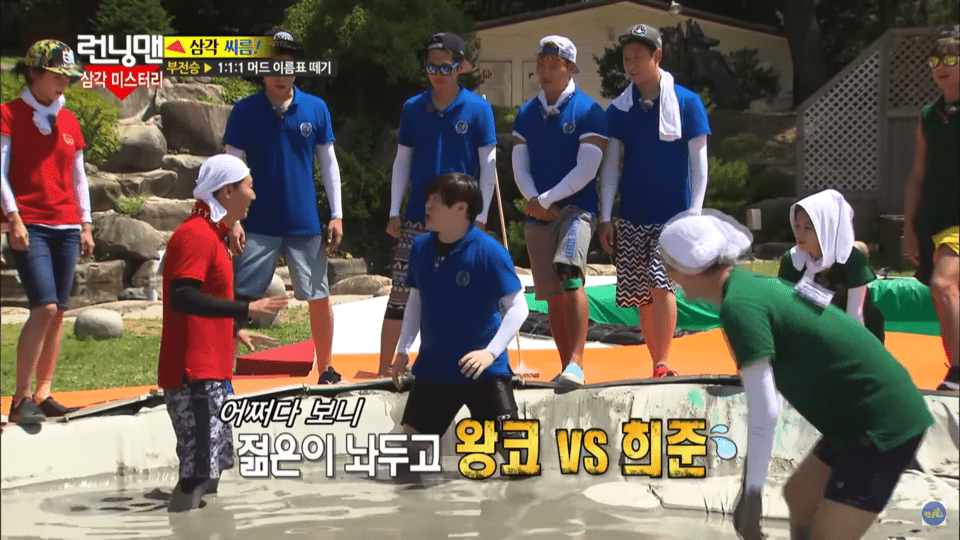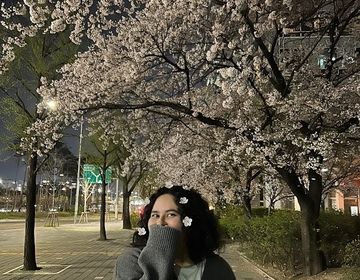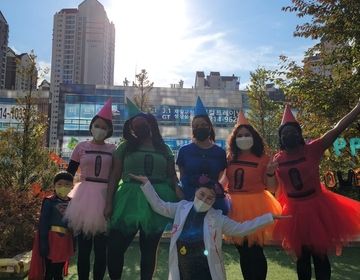Learn Korean with K-Media: Advice from Valerie!
Hello! My name is Valerie, and I will be teaching in South Korea through the EPIK program starting this spring. With my interests being in Korean cultural studies, teaching in Korea will be a way for me to meaningfully connect with its people and communities. I hope I can cultivate a deeper understanding of Korean culture and society through teaching and living there.
International viewers of Korean shows and films might all have this common experience – after spending countless hours binge-watching your favorite Korean dramas, you see an unsubbed clip online of someone speaking a single phrase in Korean and, miraculously, you understand it completely! Your hard work (as in your hundreds of hours tucked in bed with Netflix rolling) has finally paid off.
Having studied Korean for over six years, I can confidently say that watching Korean media has played an essential role in improving my language skills. While you can learn a lot just from watching content in the language you’re studying, it’s important to remember that media like TV shows and movies should be considered supplementary to language study – you should still be studying the language in a more formal setting whether that’s through a course or self-studying with your own materials. With that in mind, I would like to share some tips on using Korean media to enhance your language skills! These tips are geared towards a more passive approach to learning with K-media, emphasizing media more as entertainment with the added benefit of language learning. After all, watching TV and movies is meant to be fun, and studying should not take away from that!
Variety Shows vs Dramas
In my own experience, the type of media that has been the most helpful for my language development was not Korean dramas or films. Watching variety shows have helped immensely with expanding my vocabulary, learning colloquialisms, picking up aspects of pronunciation such as intonation, rate of speaking, tone of voice, and even differentiating the types of formal/informal language. In my opinion, variety shows have more authentic usages of language not only because they aren’t (usually) following a specific script, but also because many of them have participants doing challenges/games; activities which elicit genuine verbal expressions like colloquialisms, slang, jokes, etc.
The show that I believe has the best examples of all of these is Running Man (streaming on Viki, Kocowa.) Not only is there authentic language use during the games as members discuss strategies, but there are breaks in between each challenge which give viewers a chance to hear the members naturally conversate and joke around (which you can see an example of in this clip). You also often see additional on-screen subtitles in variety shows which give more context to what’s happening in the show by adding a joke, reaction, or description (see screenshots below.) Variety shows also often include Korean subtitles whenever someone speaks which can be helpful with keeping track of who is speaking.
Examples of on-screen subtitles in "Running Man".

Examples of on-screen subtitles in "Amazing Saturday".

The shows I recommend in addition to Running Man are the following:
Amazing Saturday (DoReMi Market) – a show where the main challenge is dictation; participants listen to songs and attempt to write out the lyrics they hear while also playing other guessing games relating to popular culture. It’s fun to practice my listening skills along with the participants by trying to listen and write out the lyrics myself. (Streaming on VIU)
Knowing Bros (Men on a Mission) – a show with a focus on interviewing celebrity guests, playing games, and creating comedic skits. The guests and hosts are required to use informal language with each other, no matter their age or seniority. (Streaming on Netflix, Viki)
I Live Alone (Home Alone) – a show where celebrities who live alone share aspects of their daily lives such as their hobbies, travels, and their social life. It’s a show where you can hear vocabulary about everyday tasks like cleaning, cooking, and self-care in authentic contexts. (Streaming on Viki)
K-pop idol SHINee Key introducing his home garden in “I Live Alone”.

Overall, absorbing language from variety shows requires a lot of multi-tasking – you have to be actively listening to quick and overlapping conversations while also paying attention to on-screen subtitles in addition to English subtitles. It might be a lot to ask of a beginner level language learner, but with the immersive nature of a variety series like Running Man, you might be surprised with how much language you begin to take in as you watch such as the running jokes between the members as well as various slang words/expressions that are repeated throughout episodes and even the game-related terminology such as “mission,” “success,” “failure,” etc.
When it comes to Korean dramas, the language can definitely be a lot easier to parse than variety shows simply because they are dramatized. Breaths and moments of silence are measured out between each line to increase dramatic effect, effectively slowing down the rate of speaking and giving language learners more time to process each piece of dialogue (like in this clip)! In any language, people typically don’t speak the way they do in a TV drama because dialogue is made more dramatic for entertainment. For that reason, I find K-dramas to be less authentic examples of language use, but it can still be a good resource to hear Korean language spoken at a slower pace.
Active Studying Tips and Motivation
For those looking for more specific advice on studying with Korean media, I would recommend taking a show in chunks. For example, if you want to actively study using a series, designate one episode as a “study episode” and then for the next few episodes, you can just sit back and enjoy them. Some of the ways that I like to actively engage with the content while I’m watching is by pausing to make note of phrases/colloquialisms I haven’t heard or making note of specific vocab I’m not familiar with to practice later via vocab cards/Quizlet. I also find it fun to try accurately repeating a line I hear in a show/video directly after hearing it spoken to practice with pronunciation (especially intonation!) While doing this, you can try speaking into a talk-to-text translator app (like Papago) and see if it accurately picks up what you say to check your pronunciation.
In my experience, consistently watching Korean media helped me absorb and retain the language because I genuinely found the content entertaining; the key is to find topics/genres that most interest you. As a language learner, it’s most practical to approach media as a form of entertainment in addition to being a study tool to prevent watching from feeling like a chore. Just remember to be actively engaged with the language you are hearing and seeing – I’d like to think learning comes naturally when you’re enjoying yourself!
Related Posts
A Comprehensive Budgeting Guide for English Teachers in South Korea
A Comprehensive Budgeting Guide for English Teachers in South Korea Teaching English in South Korea has become an increasingly popular option for young people looking to travel and get some... keep reading
Professionalism in South Korea as a Native English Teacher
As a native English teacher in South Korea, understanding Korean culture and professionalism is crucial for both personal success and the broader impact you can have on your students. South... keep reading
How to Go to the Doctor in South Korea as an English Teacher: A Guide to Healthcare and Health Insurance
As an English teacher in South Korea, maintaining good health is essential while living abroad. Navigating the healthcare system can seem daunting and stressful at first, especially if you can’t... keep reading




